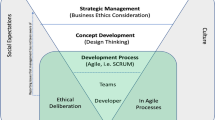Abstract
More and more organisations formulate a code of conduct in order to stimulate responsible behaviour among their members. Much time and energy is usually spent fixing the content of the code but many organisations get stuck in the challenge of implementing and maintaining the code. The code then turns into nothing else than the notorious "paper in the drawer", without achieving its aims. The challenge of implementation is to utilize the dynamics which have emerged from the formulation of the code. This will support a continuous process of reflection on the central values and standards contained in the code. This paper presents an assessment method, based on the EFQM model, which intends to support this implementation process.
Similar content being viewed by others
References
Donaldson, T.: 1995, 'The Stakeholder Theory of the Corporation: Concepts, Evidence and Implications', The Academy of Management Review 20(1), 65–91.
Fisscher, O. A. M., A. H. J. Nijhof, A. T. Laan and W. Schreuder: 2001, 'De verantwoordelijke firma, over een nieuwe fase in de ontwikkeling van de industrie', Management en Organisatie 55(2), 58–75.
Gemeente Amsterdam: 2000, Stedelijk eindrapport project ‘Correct ... of corrupt?’, Meer weerbaar, Concern personeel en organisatie, bureau integriteit, pp. 1–48.
Goodpaster, K. E.: 1989, 'Ethical Imperatives and Corporate Leadership', in K. Andrews (ed.), Ethics in Practice; Managing the Moral Corporation (Harvard Business School Press, Boston), pp. 155–167.
Hardjono, T. W.: 1997, The European Way to Excellence, How 35 European Manufacturing, Public and Service Organisations Make Use of Quality Management (Directorate–General III Industry, European Commission).
Kaptein, S. P., H. K. Klamer and J. C. J. ter Linden: 2000, De integere organisatie; het nut van een bedrijfscode (Vereniging NCW, Den Haag).
Kolb, D. A.: 1984, Experiential Learning: Experience as the Source of Learning and Development (Prentice Hall, Englewood Cliffs).
Mathews Cash, M.: 1987, 'Codes of Ethics; Organizational Behaviour and Misbehaviour', Research in Corporate Social Performance and Policy 9, 107–130.
McDonald, G. and A. H. J. Nijhof: 1999, 'Beyond Codes of Ethics: An Integrated Framework for Stimulating Morally Responsible Behaviour in Organisations', Leadership & Organisations Development Journal 20(3), 133–146.
Melé, D., E. Garriga and M. Guillén: 2000, 'Corporate Ethics Policies in the 500 Largest Companies in Spain', Working Paper 00/4bis (IESE Publishing, Barcelona).
N.B.E.S.: 2000, National Business Ethics Survey, Research Report (Ethics Resource Center, Washington DC).
SER: 2001, De winst van waarden (Sociaal Economische Raad, Den Haag).
Van der Bij, H. et al.: 2001, Kwaliteitsmanagement in beweging, van blauwdruk naar contingenties en dynamiek (Kluwer, Deventer).
Weller, S.: 1988, 'The Effectiveness of Corporate Codes of Ethics', Journal of Business Ethics 7(5), 389–395.
Author information
Authors and Affiliations
Rights and permissions
About this article
Cite this article
Nijhof, A., Cludts, S., Fisscher, O. et al. Measuring the Implementation of Codes of Conduct. An Assessment Method Based on a Process Approach of the Responsible Organisation. Journal of Business Ethics 45, 65–78 (2003). https://doi.org/10.1023/A:1024172412561
Issue Date:
DOI: https://doi.org/10.1023/A:1024172412561




